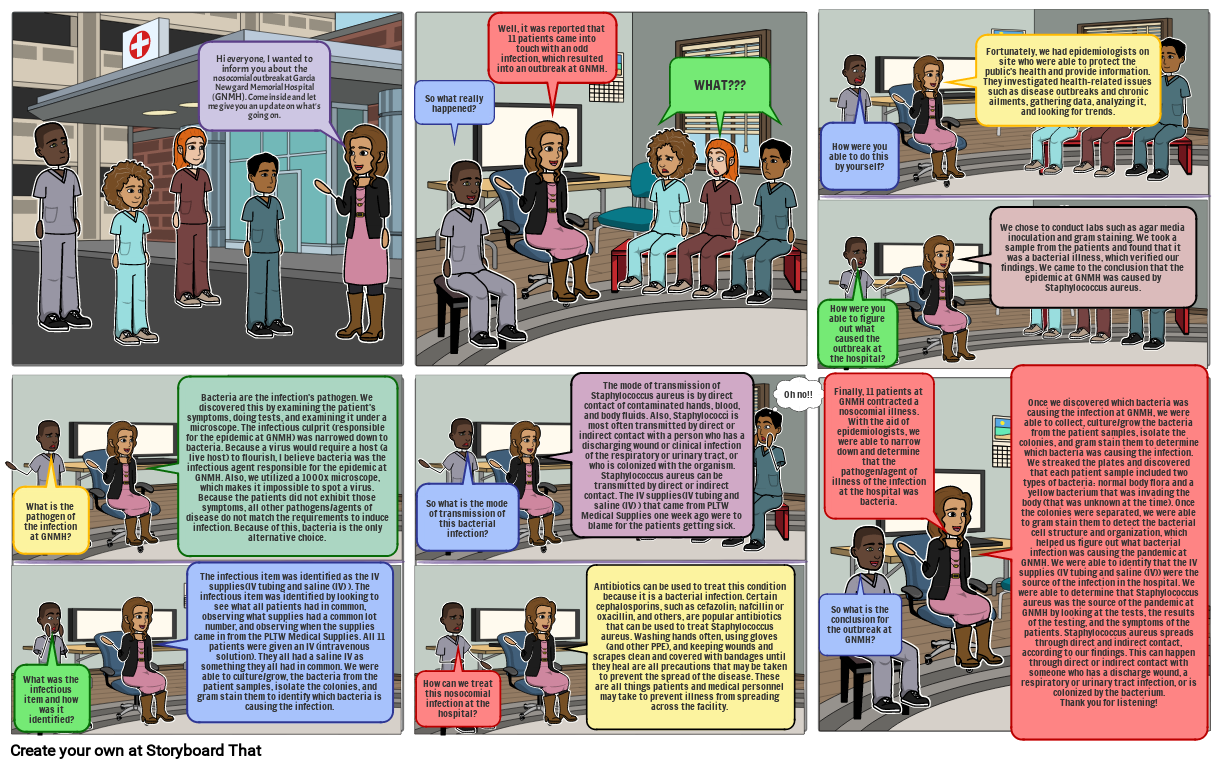Story Board At GNMH

Storyboard Text
- Hi everyone, I wanted to inform you about the nosocomial outbreak at Garcia Newgard Memorial Hospital (GNMH). Come inside and let me give you an update on what's going on.
- So what really happened?
- Well, it was reported that 11 patients came into touch with an odd infection, which resulted into an outbreak at GNMH.
- WHAT???
- How were you able to do this by yourself?
- Fortunately, we had epidemiologists on site who were able to protect the public's health and provide information. They investigated health-related issues such as disease outbreaks and chronic ailments, gathering data, analyzing it, and looking for trends.
- We chose to conduct labs such as agar media inoculation and gram staining. We took a sample from the patients and found that it was a bacterial illness, which verified our findings. We came to the conclusion that the epidemic at GNMH was caused by Staphylococcus aureus.
- Once we discovered which bacteria was causing the infection at GNMH, we were able to collect, culture/grow the bacteria from the patient samples, isolate the colonies, and gram stain them to determine which bacteria was causing the infection. We streaked the plates and discovered that each patient sample included two types of bacteria: normal body flora and a yellow bacterium that was invading the body (that was unknown at the time). Once the colonies were separated, we were able to gram stain them to detect the bacterial cell structure and organization, which helped us figure out what bacterial infection was causing the pandemic at GNMH. We were able to identify that the IV supplies (IV tubing and saline (IV)) were the source of the infection in the hospital. We were able to determine that Staphylococcus aureus was the source of the pandemic at GNMH by looking at the tests, the results of the testing, and the symptoms of the patients. Staphylococcus aureus spreads through direct and indirect contact, according to our findings. This can happen through direct or indirect contact with someone who has a discharge wound, a respiratory or urinary tract infection, or is colonized by the bacterium.Thank you for listening!
- What is the pathogen of the infection at GNMH?
- Bacteria are the infection's pathogen. We discovered this by examining the patient's symptoms, doing tests, and examining it under a microscope. The infectious culprit (responsible for the epidemic at GNMH) was narrowed down to bacteria. Because a virus would require a host (a live host) to flourish, I believe bacteria was the infectious agent responsible for the epidemic at GNMH. Also, we utilized a 1000x microscope, which makes it impossible to spot a virus. Because the patients did not exhibit those symptoms, all other pathogens/agents of disease do not match the requirements to induce infection. Because of this, bacteria is the only alternative choice.
- The infectious item was identified as the IV supplies(IV tubing and saline (IV) ). The infectious item was identified by looking to see what all patients had in common, observing what supplies had a common lot number, and observing when the supplies came in from the PLTW Medical Supplies. All 11 patients were given an IV (intravenous solution). They all had a saline IV as something they all had in common. We were able to culture/grow, the bacteria from the patient samples, isolate the colonies, and gram stain them to identify which bacteria is causing the infection.
- How can we treat this nosocomial infection at the hospital?
- So what is the mode of transmission of this bacterial infection?
- The mode of transmission of Staphylococcus aureus is by direct contact of contaminated hands, blood, and body fluids. Also, Staphylococci is most often transmitted by direct or indirect contact with a person who has a discharging wound or clinical infection of the respiratory or urinary tract, or who is colonized with the organism. Staphylococcus aureus can be transmitted by direct or indirect contact. The IV supplies(IV tubing and saline (IV) ) that came from PLTW Medical Supplies one week ago were to blame for the patients getting sick.
- Antibiotics can be used to treat this condition because it is a bacterial infection. Certain cephalosporins, such as cefazolin; nafcillin or oxacillin, and others, are popular antibiotics that can be used to treat Staphylococcus aureus. Washing hands often, using gloves (and other PPE), and keeping wounds and scrapes clean and covered with bandages until they heal are all precautions that may be taken to prevent the spread of the disease. These are all things patients and medical personnel may take to prevent illness from spreading across the facility.
- Oh no!!
- How were you able to figure out what caused the outbreak at the hospital?
- So what is the conclusion for the outbreak at GNMH?
- Finally, 11 patients at GNMH contracted a nosocomial illness.With the aid of epidemiologists, we were able to narrow down and determine that the pathogen/agent of illness of the infection at the hospital was bacteria.
- What was the infectious item and how was it identified?
Over 30 Million Storyboards Created
No Downloads, No Credit Card, and No Login Needed to Try!
